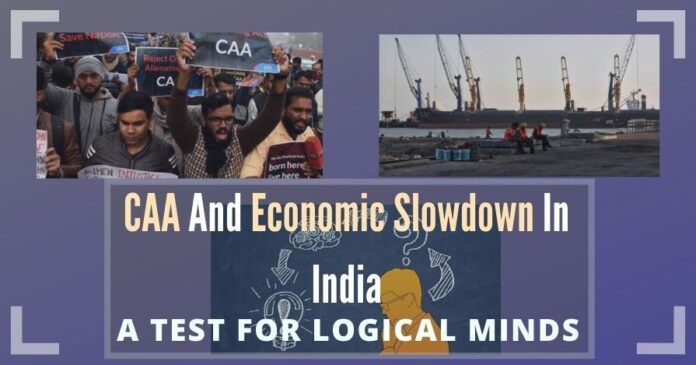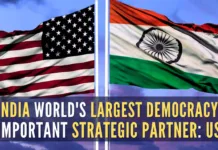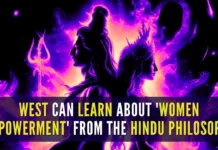
CAA is said to be discriminatory without ever saying how it is, whereas the various possible reasons for Economic Slowdown are extensively enumerated without much specifying or suggesting the remedial measures.
There are two topics dominating writings these days in media, one on the Citizenship Amendment Act (CAA) and the other on the economic Slowdown in India. In the former, the CAA is said to be discriminatory without ever saying how it is so. In a recent article by Gurcharan Das in TOI [1], such one-liner has been used and there is no effort taken to explain or justify the statement made.
Every logical mind should, therefore, welcome the grant of citizenship to all such people, taking into consideration historical reality and the humanitarian aspect.
On the other extreme is Nadella, the Microsoft Chief. He has said many things but the net result is of utmost ambiguity and it appears that he has not read the text of the amendment. However, the CAA is essentially very straightforward and easily understandable as may be seen from the following.
CAA seeks to grant citizenship to non-Muslim immigrants from Pakistan, Bangladesh, and Afghanistan if they faced religious persecution there. In order to acquire citizenship in India, one needs to go through a naturalization process. One of the criteria of naturalization is that the concerned person has to live in India or work in the Central Government for 11 years. What this amendment does is that it reduces this period to six years for Hindus, Sikhs, Buddhists, Jains, Parsis, and Christians from Afghanistan, Bangladesh, and Pakistan. But they still have to go through the process of naturalization.
The point to note is that these refugees were citizens of undivided India and they were forced to flee their own homes for saving their lives after being subjected to atrocities on the grounds of religion. They are different from the migrants who left Bangladesh / Pakistan/ Afghanistan for economic reasons. Every logical mind should, therefore, welcome the grant of citizenship to all such people, taking into consideration historical reality and the humanitarian aspect.
It must at the same time be clearly understood that applications for citizenship in India by Muslims have been and will continue to be entertained under the citizenship act. In the last six years, as many as 2838 Pakistani refugees, 914 Afghan refugees and 172 Bangladeshi refugees including Muslims have been given Indian citizenship. Further, the argument that the CAA discriminates against Muslims and therefore ultra vires the constitution is not tenable. It instead positively discriminates in favour of other religions which is allowed by the constitution. This was similarly done in case of reservation for SC & ST. Moreover, CAA has nothing to do with the current citizens of India or the rights they are guaranteed under the Constitution. This is what the intellectuals and academics should put forward before the masses especially the Muslims who have been incited by this false propaganda that it is discriminatory against the Muslims in India.
This false propaganda has created unrest among the Muslims and instability in the country. This is very unfortunate in the context of a prevailing slowdown in India when the whole nation’s focus should be on how to revive the economy. It is, however, unlikely that national interests will override short time political gains in the calculations of our political parties. Economic remedies have to be devised factoring in the continued troubles and pinpricks created by the opposition.
To boost demand further, the disposable income of households must be increased. The govt may mull over introducing a basic income scheme for the poorer section of the society.
In the writings on economic slowdown in India, the various possible reasons for this are extensively enumerated without much specifying or suggesting the remedial measures that need to be taken except that the demand needs to be boosted. How this demand boosting in the backdrop of the prevailing difficult fiscal situation is to be done is not indicated most of the time. These writings are not directed at finding solutions, but at shoring up the writers’ credentials with the like-minded.
But Shri Deepak Nayyar said it in Mint, the government should use counter-cyclical, expansionary, macroeconomic policies to revive growth[2]. Fiscal policy should provide a stimulus, preferably by stepping up public investment. Monetary policy should provide a stimulus to private investment by lowering interest rates. There is nothing in macroeconomics that stipulates an optimum level to which the fiscal deficit must be reduced as a proportion of GDP. Government borrowing is always sustainable if it is used to finance investment and if the rate of return on such investment is greater than the interest rate payable.
The solution, therefore, is to allow the fiscal deficit to rise some say by 0.5% of GDP, using that to finance public investment and to drop interest rates in steps by at least 2 percentage points, which would also help the exchange rate depreciate. Together, these would stimulate investment and promote exports, to revive economic growth. This is likely, although, to lead to lower deposit interest rates impacting small savings.
It may revive the consumption by pumping more money into the hands of farmers and urban consumers, but also simultaneously reducing subsidies like fertilizer subsidy, which can be subsumed in another dollop of a PM Kisan Samman payout of Rs 6,000 annually to each farmer.
To boost demand further, the disposable income of households must be increased. The govt may mull over introducing a basic income scheme for the poorer section of the society. It can also consider increasing the minimum pension adequately for the retirees in the govt./public sector. It will put more money into the hands of these two sections of the populace where the marginal propensity to consume is high. The resource-transfer of ₹1.76 trillion from RBI has provided the government with a windfall bonanza, meant to finance the fiscal deficit, Further, If the RBI board agrees to an interim dividend based on their six-month performance, it would provide some financial relief to the government, which all can be used partly for this purpose.
Note:
1. The views expressed here are those of the author and do not necessarily represent or reflect the views of PGurus.
References:
[1] And now, the good news: Pessimism isn’t warranted. If you can take the long view, the world is getting better – Jan 14, 2020, Times of India
[2] Managing India’s economic downturn: the demand side – Oct 10, 2019, Mint
- The real Parivartan is to be ushered in now. - March 23, 2021
- When will the truth dawn on Bengalis? - March 13, 2021
- The many arguments of anti-Modi intellectuals - November 5, 2020











You say :
//The point to note is that these refugees were citizens of undivided India and they were forced to flee their own homes for saving their lives after being subjected to atrocities on the grounds of religion. They are different from the migrants who left Bangladesh / Pakistan/ Afghanistan for economic reasons.//
Migrants who leave on their own are different from refugees.
Migrants who leave on their own for any reason are not called refugees.
Only those who are forced to leave their country because they risk their lives if they continue to stay there are called refugees when they take refuge in another country.
So stop obfuscating the issue.
Clearly explain how religious persecution is different from any other kind of persecution , and why does religious persecution deserve a special treatment by India only when it pertains to these 3 countries.
Myanmar was a part of undivided India ; why has this amendment been extended to Myanmar ?
First explain these two points ; I will have more points later on ,if you explain these two satisfactorily.
Myanmar was a part of British Empire and was never a part of India.
Have you Googled ?
No, I didn’t Google. I went to school.
So your learning stopped once you left school ?
Sad.
For you, I am doing this again. Google is a short-cut for persons who learned nothing anywhere, in schools or otherwise (rude, too) and pretend to be informed. In any case, Google can not and does not alter a fact.
End of this conversation.
Mr Dutt, instead of making silly comments, if you had applied your limited brain to the 2 pertinent points raised by Mr Rao, I would not have wasted 3 min of my life, but I suppose you are incapable of doing that.
Very thoughtful article with good suggestions for the path forward. But guaranteed basic income without it tied to productive work, will not succeed. Hand-outs will be never-ending as the history shows. At Davos the other day, a number of Indian industrialists admitted that they were sitting on a mountain of cash, but would not invest in new plants and machinery because of lack of demand currently. I guess they have never heard of investing in plant infrastructure to make plants more efficient, more productive, more safe, less environmentally damaging as well as planning for the future capacity. It is easier to sit on one’s hands. Or better still, enjoy clean mountain at Davos while spending the windfall reduction in taxes that Modi administration just gave the corporations.
None of the top mega scams perpetrated by the UPA regime has been effectively addressed and proven in the court of law over the last six years. The ruling Govt., Bureaucracy and judiciary System is weak and incapable of delivering on promises made.
Sir,
बाजार में मुख्य डिमांड
EV
सोलर बिजली सिस्टम
सरकार इन दोनों में इन्वेस्टमेंट करे और मुनाफा कमाए।
इनका उत्पादन इतना करे कि लागत कम हो सके
वस्तुए सस्ती यानी अफोर्डेबल हो।
जैसे गाड़ियों में
आल्टो,
उससे ऊपर स्विफ्ट डिजायर
फिर suv
ऐसी ही EV रेंज हो।
सोलर सिस्टम हर घर लगाए ऐसी कोसिस हो।
उसके लिए
सोलर वाटर हीटर 25000 में लग सकता है।
बिजली सिस्टम 50000 से 100000 के बीच हर घर मे लग जाय तो भारतीय अर्थव्यवस्था दौड़ने लगेगी।
मध्यम वर्ग के पास पैसा हैं परन्तु चॉइस उसके पास आज और अगले 10 साल इन 2 items की ही रहने वाली है।
बांकी सब कुछ वह खरीद चुका
TV
Freeze
WM
Mobile
Cable connection/DTH
2 व्हीलर/गाड़ी
Consumer items की demand में कोई कमी नही हुई हैं।
अब सबकी जरूरत है
सोलर बिजली
EV
Nobody in the media or IMF Economist – Ms Gopinath nor any other Economist in the country has any explanation for the corruption that ruled in UPA regime & flow of money through shell companies. Closing the money laundering doors has seriously affected black money generation & induction of GST has made these businessmen go crazy or mad i.e.f stifled for oxygen money.